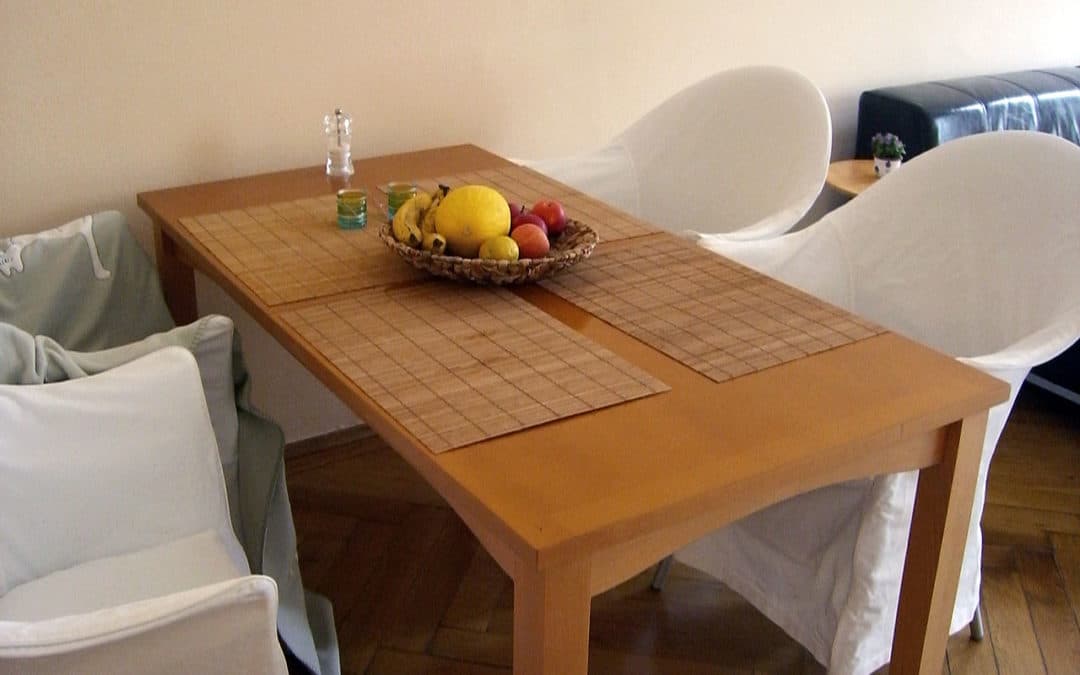Jacqueline asked me to produce this beginner’s show. She wanted to know what the furniture in a room is called in German. So let’s start our tour through a virtual apartment. If you enter a typical German apartment, you open the door, die Türe, die Türe, and get into a corridor. It is called Flur. Here you can take your shoes off and put your coat on a hanger. The place to store your shoes and coat is called Garderobe. Garderobe. It is the cloakroom. But now off on our tour!
We start with the living-room. It is called Wohnzimmer in German. Wohnzimmer. In the living-room there’s usually a place to sit, for example a couch. We also call it a couch in German. Or sofa. If you sit on a sofa and want to drink something, you put it in front of you on a small table. That table is called Couchtisch. Couch-Tisch.
In some living-rooms there’s also a space for dining. But many homes have a separate area that is called Esszimmer. Dining room. Ess-Zimmer. The main piece of furniture here is a table. It is called Tisch in German. Tisch. You sit at a table. And you sit on chairs. Chairs are called Stühle. One chair is a Stuhl. More chairs are Stühle. Stühle.
We go through to the bedroom. It is called Schlafzimmer in German. Schlafzimmer. The main thing in a bedroom is the bed, of course. And that one is easy to remember, it is called Bett in German. Bett. Beside the bed there is a small table to put books on. It is called a Nachttisch. Nacht-Tisch. On it there is a lamp. The Nachttischlampe. Nacht-Tisch-Lampe. You put your clothes in a wardrobe, it is called Schrank in German. Schrank.
What more is there to tell you? If you want to store your books somewhere, you put them on a shelf. A shelf is a Regal. Regal. I think that’s enough for today. Have fun learning German!



Hallo Annika,
Vielen dank fur deine podcast. Ich komme aus Indian und deine podcasten sind sehr interessant.
Ashok
Guten Tag, Annik:
Vielen Dank für den Podcast. Er ist sehr nützlich.
Grüße.
Rene
Hello!
Thank you so much for doing these podcasts! I am an absolute beginner and I find your audios very helpful.
I have a little request, if you are planning on doing some more of those beginners topics (and I’m definitely following them! :)), could you please include an article (definite or indefinite) whenever you present a new noun in German, like you did with „the door“. It would be very helpful!
Thank you again and a lot! 🙂
Superbe poste, une fois de plus
If you download iTunes and subscribe to the podcast, you can download single episodes or all of them at once. Here’s one of many explanations: http://www.askdavetaylor.com/how_to_subscribe_to_npr_podcast_itunes_11/
Thank you very much For this interesting podcast, i have studi ed german at school more than 20 years ago and i need to refresh it. I hated it, because of the Method. This way seems more enjoyable.
but: How to download it? I got a podcast app as you suggested, than downloaded the rss, now what next? Danke schon.
You are right, that’s one of the topics on my to-do-list… In the newer episodes I already do that.
Hi
I’m starting with my German lessons here in Chile. My teacher (a German guy) told me about the slow german website. It’s very useful for me and my son Andreas. Maybe one little thing. It will be interesting to learn the nouns with their articles at the same time.
Thanks!!!
Hallo!
I these beginner podcasts contine, I realy like them! Maybe a dedicated sparate podcast in the future??? 🙂
Thanks for making these!
Bob (fae Schottlang)
Slow listening is very good to speak correct pronounciation for the people who don’t have any source to listen the German.
I have suggestion, if a pause/ stop can be incerted and also provide the rebinding the speech so that one can listen again and again the word for which one wish to improve the word specific pronouncation.
It will be a great help for the beginer.
Awaiting your response.
Thanking you,
Regards,
Prayag Dutt
Install a Podcasting App, there are many. And then subscribe to the RSS Feed.
Hallo)
Ist it possible to get SLOW GERMAN PODCASTS in my new SAMSUNG S4??
What must I do to install it on my telephone?
Thanks very much
Hi Teresa, the level is B1, it’s not for absolute beginners. You can use your iPod to play the episode at half speed… In the new learning materials, I am including the articles, you are absolutely right, I should have done that a long time ago!
Hallo!
Thanks for the website I find it very interesting. However, can you please have VERY, very slow german because I still find your recordings too fast. Also adding the article, Der, Die, Das would be very helpful.
Danke
Teresa
Thanks a lot for the podcast with words.
However, it would be extremely helpful to hear words with articles: der, die oder das.
Thank you so much for this website! I stumbled across this through your iTunes podcast. I’ve been trying to learn German for about a year now and all the cd’s and translation programs just haven’t been right. Your podcast/website makes learning fun and easy! Please keep doing what you are doing! Danke!
Hallo Annick!
could you keep making beginner episodes please ?!!
the four you’ve done are really good!very useful!
regards
Guten Tag, Annik!
Danke für alles was Sie machen, Sie sind wirklich wunderbar!
Also, ich bin südafrikanisch, aber ich wohne mit meinem Vater in Neuseeland. Ich interessiere mich sehr für Musik (besonders Oper und klassische Musik im Allgemeinen). Deshalb will ich fragen ob Sie vielleicht eines Tages ein Podcast über einige der berühmtesten deutschen Komponisten (wie Wagner und Schubert,z.B.) machen können? Das wäre fantastisch!
UND
Wenn Sie nicht zu viel zu tun haben, können Sie vielleicht auch ein Podcast über Berlin oder die Umwelt/Vegetarismus machen denn sie sind beiden zwei meiner großen Leidenschaften.
Vielen Dank!
Luka aus Neuseeland/Südafrika 😀
Guten Tag, Annik.
I heisse Jim und ich lebe an einem kleinen regnerischen Insel, Bainbridge Island, westlich von Seattle, Washington, in den Vereinigten Staaten. Es gibt keine Brücke nach Seattle, so nehmen wir eine lange Bootsfahrt, mit der Zeit zu denken oder zu studieren.
Ich versuche Deutsch zu lernen. Vor vielen Jahren an der Universität, die deutsche Professorin, Frau Schröder hat uns gesagt, dass wir Stammwörter lernen sollen, damit wir die meisten der/die/das lernen können, mit der keinsten Anzahl von Wörtern. Ich suche eine solche Liste, aber finde ich sie noch nicht.
Als ein Kind, lernte ich, dass Michael=er, Susan=sie, und house=es. Doch die ‚er‘ und ’sie‘ ausschliesslich für Mensch und Tier. Wie schaffe ich eine Brücke zwischen englishes und deutsches Denken in dieser Angelegenheit? Vielleicht sollte ich verstehen das Wort, Tür wie der Name einer Frau, und Baum wie der Name eines Mannes, und Haus wie der Name eines Dinges. Wann ich eine solche Vokabelliste lese, dann stelle ich mir vor, dass ich die Namen der Schüler in einer grossen Schule. Nun scheint die ‚der/die/das‘ mehr verstehbar in einer englischer Weise, d.h., wie mein Gehirn funktioniert. Wann ich einen Baum sehen, habe ich kein Gefühl von der/die/das — es ist fast total ES in Englisch, mit Ausnahme von Namen von Personen und ein Paar Wörter wie Schiff, was hier eine ’sie‘ ist, anstatt ‚es‘ als wie auf Deutsch.
Ausserdem, wann wir hier Substantive lernen, denken wir nie an ‚der/die/das‘ — es gibt nur das Substantiv. Wir haben nur ein ‚the‘ und Deutsch hat sechzehn davon. Ich kann mir nur vorstellen, dass die deutsche Welt bunter ist. Fehlt unsere Welt eine zusätzlich Dimension? Vielleicht. Also, möchte ich diese Erfahrun zu gewinnen. Ich lerne gern Deutsch, damit ich besser erleben kann.
Jede Hilfe, herauszufinden, wie ‚der/die/das‘ besser lernen wird sehr geschätzt.
Hochachtungsvoll
Jim
da italiano amante della lingua tedesca e‘ piaciere ascoltare e leggere in un einfach und easy german le vostre lezioni
da slow german.